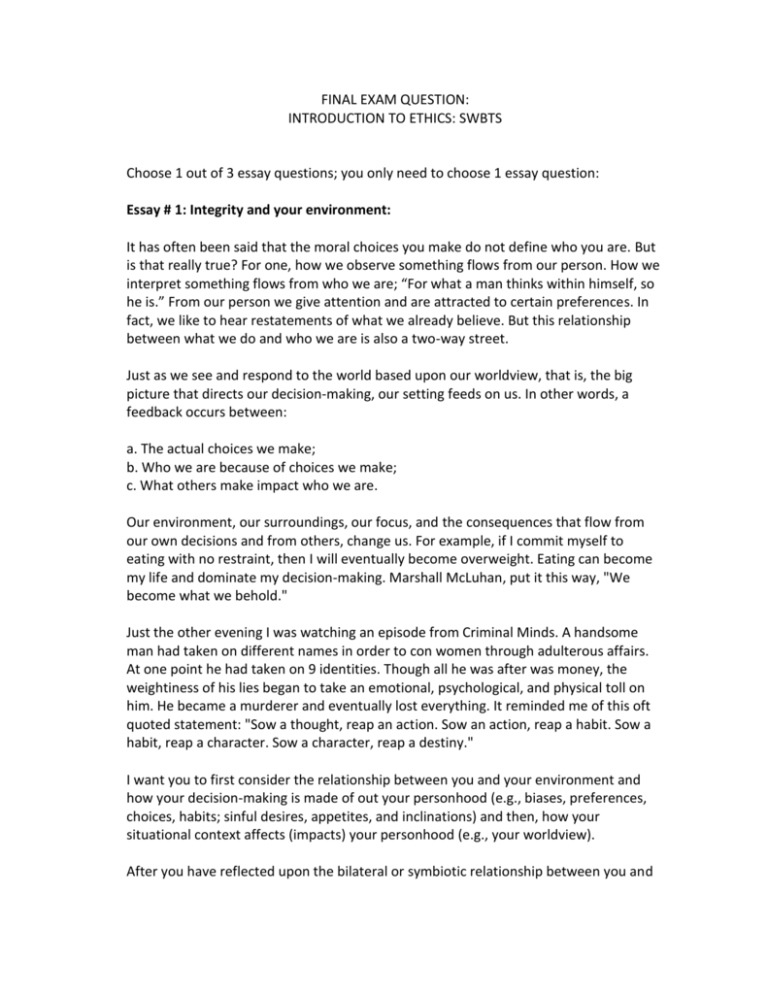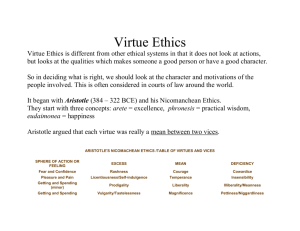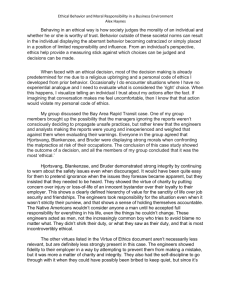FINAL EXAM QUESTION: INTRODUCTION TO ETHICS: SWBTS
advertisement

FINAL EXAM QUESTION: INTRODUCTION TO ETHICS: SWBTS Choose 1 out of 3 essay questions; you only need to choose 1 essay question: Essay # 1: Integrity and your environment: It has often been said that the moral choices you make do not define who you are. But is that really true? For one, how we observe something flows from our person. How we interpret something flows from who we are; “For what a man thinks within himself, so he is.” From our person we give attention and are attracted to certain preferences. In fact, we like to hear restatements of what we already believe. But this relationship between what we do and who we are is also a two-way street. Just as we see and respond to the world based upon our worldview, that is, the big picture that directs our decision-making, our setting feeds on us. In other words, a feedback occurs between: a. The actual choices we make; b. Who we are because of choices we make; c. What others make impact who we are. Our environment, our surroundings, our focus, and the consequences that flow from our own decisions and from others, change us. For example, if I commit myself to eating with no restraint, then I will eventually become overweight. Eating can become my life and dominate my decision-making. Marshall McLuhan, put it this way, "We become what we behold." Just the other evening I was watching an episode from Criminal Minds. A handsome man had taken on different names in order to con women through adulterous affairs. At one point he had taken on 9 identities. Though all he was after was money, the weightiness of his lies began to take an emotional, psychological, and physical toll on him. He became a murderer and eventually lost everything. It reminded me of this oft quoted statement: "Sow a thought, reap an action. Sow an action, reap a habit. Sow a habit, reap a character. Sow a character, reap a destiny." I want you to first consider the relationship between you and your environment and how your decision-making is made of out your personhood (e.g., biases, preferences, choices, habits; sinful desires, appetites, and inclinations) and then, how your situational context affects (impacts) your personhood (e.g., your worldview). After you have reflected upon the bilateral or symbiotic relationship between you and your context or situational setting, answer this question: (1) What is integrity? In other words, define personal integrity. (2) How can the context, that is, the situational setting in which you live, and move, and have your becoming, be used to IMPROVE personal integrity (e.g., family, community, job, relationships, hobbies, forms of entertainment); (3) How can your integrity IMPROVE your context (e.g., family life; community, etc). Stated in another way, this essay is rooted in the discourse between you and your environment. I'm asking how you define integrity, how your integrity can be improved by your environment, how your integrity can improve your environment. Essay # 2: Can Virtue Ethics Do the Whole Work of Ethics: In her very influential 1958 article, “Modern Moral Philosophy," (which brought virtue ethics back to the forefront of discussion as a self-standing ethical approach) British scholar Gertrude Elizabeth Margaret Anscombe makes the following two related claims: First, the historical notions of morality-of moral duty and obligation, of “ought” in general-are intelligible today’s world. Her justification for this first claim is found in the justification of her second claim. Second, G.E.M. Anscombe rejects a "law conception of ethics" [that is, ought-rules for us to follow] for she argues that deontological ethics and even consequential ethics are untenable without the notion of a Divine Lawgiver. In other words, there is no sound basis for objective values, duties, and accountability if God does not exist. Since modern philosophy banished God, regarding him as either irrelevant or non-existent, rule-based ethics [that is,any ought-type rules] are ultimately anachronistic. She states, “It is as if the notion ‘criminal’ were to remain criminal law and criminal courts has been abolished and forgotten (pg. 30).” Her conclusion is that if moral philosophy is to be secular and humanistic centered, we should consider turning to Aristotle. Why? Aristotle advocated the notion that we master the functional requirements within a given type or kind of tasks/behaviors that are judged to be most worthy by the community. Once we possess habitual mastery of the functional requirements to an appropriate degree we have achieved excellence. Anscombe also went onto argue that if we do return to Aristotle, then moral philosophy ‘should be laid aside…until we have an adequate philosophy of psychology” (pg. 26). But can virtue ethics alone generate all the moral values, duties, and accountabilities that are needed in society? My basis for this question reflects criticisms made against virtue ethics such as (1) virtue ethics lacks clarity in resolving moral conflict; (2) there are vast differences on what constitutes a virtue; (3) well-being is a master-value and all other things are valuable to the extent that they can contribute to it; (4) virtue ethics is self-centered because its primary concern is the agent's own character; (5) virtue ethics leave us hostage to luck for some will attain moral maturity and others will not (given the fact that a certain set of external goods to achieve virtue is needed and because of the fragility of life); (6) virtue ethics fails to give to us any help with the practicalities of how we should behave. Dr. William Frankena summed up the problem this way, "Virtues without principles [deontological ethics] is blind." So, once again, the question I am asking is, "Can virtue ethics do the WHOLE work of ethics?" The "whole" includes accountability, duties, and values. # Essay # 3: Refutation of Relativism: In this essay, based upon your reading of Peter Kreeft’s text, I want you to summarize Kreeft’s major arguments against relativism. Afterwards, explain how you intend to use these arguments in your practical ministry.






